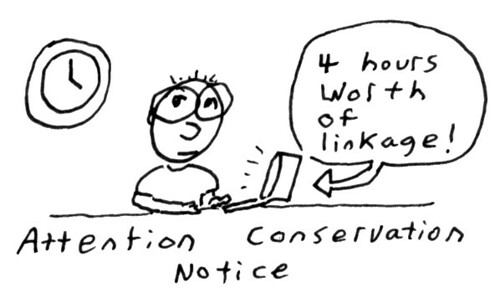Designs On Your Lifestyle
Tiara Shafiq has not been getting a lot of love from the bureaucracy down in Australia, as she tries to land a little paying work. Heck, maybe all she needs is a positive attitude! That’ll fix everything!
Actually, she’s heard that one before – and responds with an elegant dissection of ‘The Problem With Lifestyle Design Blogs’, particularly the most prominent, ‘The Four Hour Work Week’. ‘Lifestyle Design’ is the latest trend in the world of self-help, and I’d like to add my two cents by setting the book in context.
The States has a long tradition of self-help / empowerment writing, by authors such as Napoleon Hill (Think and Grow Rich), Earl Nightingale, Tony Robbins (Unlimited Power) and David Allen (Getting Things Done). The best of the bunch offer some general principles and leave the rest up to you. I’m a fast reader and enjoy backtracking to find out the intellectual pedigree of the book du jour. (Is the author a Scientologist, Skinner rat man or pseudoscience adherent?)
‘The 4 Hour Workweek’ was aimed carefully at English speaking USA folks. And there’s definitely an element of class in there: either you’re on the ‘New Rich’ (NR) bus or you’re not. Clearly, not everyone can be ‘New Rich’, certainly not the outsourcers providing services for them. Ferriss’ book is predicated on the continued existence (and exploitation) of global inequality.
I’m literate, and through sheer luck happened to be born into USA citizenship, and have the benefit of a college education. Which means I’m pretty clearly within the privileged core audience targeted by the self-help crowd. So:
Have these books benefited me at all?
For tips and tricks, as well as amusement, they’re fun to examine and pull apart. I’d enjoy having a coffee and chat with the authors. But a manifesto is NOT a life manual covering every situation. For that you’ll want to turn to your personal beliefs and goals. Sorting out your life is up to you.
What about the rest of the planet?
The further self-help books travel out of their North American context, the less relevance they have. ‘Lifestyle design’ literature posits a global system but courts a developed country readership.
Is outsourcing a viable choice for those with the money to do it?
‘The 4 Hour Workweek’ oversimplifies outsourcing. It takes a lot of front end effort to set up a working relationship, and communications can be a challenge even with the best of providers.
You will never swing easy in your hammock unless you have confidence that your new partners are operating in accordance with internationally accepted labor standards, and have ethical standards. Look before you leap. Would you like to make new friends and partners, or do you just expect a magical overseas army to make your problems disappear?
In my view, the best organizations to work with are committed to a more equitable playing field. That’s a challenge I grapple with on a daily basis, having set up two outsourcing operations.
Self-Help Blogging: who is helping who?
Probably the most fascinating trajectory on the web regarding lifehacking/productivity is of ‘43 Folders’. It’s Merlin Mann’s exploration of ‘Getting Things Done’, as he explores the system, learns to use it, and then *outgrows* it. Along the way, he comments on the evolution of focus from productivity and ‘lifehacking’ to ‘lifestyle design’:
One particularly gifted arrival on the productivity and self-help scene authored some of the most profoundly useful advice I’d ever heard about attention management — but, then followed it up by showing how those extra cycles could be used to game the system so efficiently that you can sit in a hammock for 164 hours a week while people in India write birthday cards to your friends. That one became a runaway bestseller and, perhaps unintentionally, formed the new template for how to market productivity as an extreme lifestyle. I also have to imagine that it singlehandedly revived our nation’s sagging hammock industry.
… and chides neighbor Zen Habits for getting a bit off course to boot. Merlin now posts sparingly, having found a balance that works for him.
I would like to challenge the self appointed online experts of the burgeoning self-help / lifestyle design industry to actually sit down and write a book.
Some of them haven’t even left their day job. And they’re all so relentlessly HAPPY. Life has ups and downs, but if you’re selling yourself as a model of success, you’re not allowed bad days. Ever.
There’s a lot of people purveying advice who may not be qualified to do so. This torrent of blogs utilizing every form of ‘social media’ are so busy sorting their metrics and pageranks that there seem to be more ‘gurus’ than followers. I find this hilarious. Maybe we can set up a market for followers to rent themselves out, they’re fast becoming a commodity!
Turning back to some key points in Tiara’s post:
Lifestyle Design: let’s retire the term. In Cambodia, where I live, young people might have designs on escaping an arranged marriage. That’s designing a lifestyle optimized for happiness.
Everyone on the PLANET aspires to improve their life in some form. Legal, fiscal, religious and governmental restrictions need to be challenged, not ignored. If we can’t abolish obstacles overnight, we need to work towards the best possible compromise in the short term, trending towards meaningful long term change.
Optimism is not a panacea. Some people don’t need to turn that frown upside down, they need counseling or medication. Putting on a ‘happy face’ is not going to solve all problems.
The genuinely optimistic people I know are great to work with. Their outlook motivates them to work hard and effectively, because they know that happiness takes effort to acquire and maintain. Hence the term ‘pursuit of happiness’.
Privilege: We don’t live in a particularly fair world. We do live in a profit-oriented one. Tiara’s impressive and concise critique demonstrates keen research / analysis / writing / web-wrangling skills, which there’s always a demand for.
Any employer that can’t recognize those skills might want to see if their hiring practices are affecting their bottom line. Social justice? Hey pal, you could be losing money there. 😉


